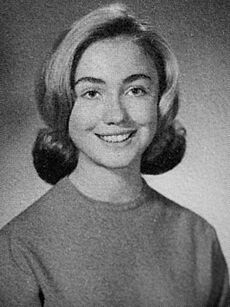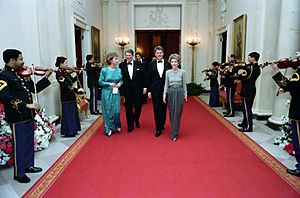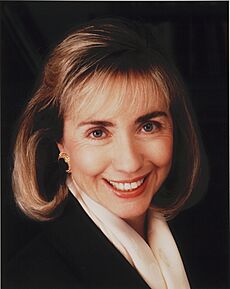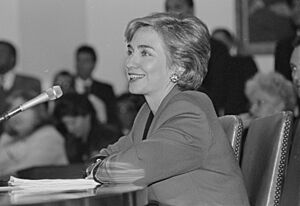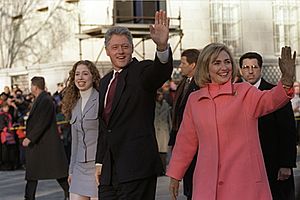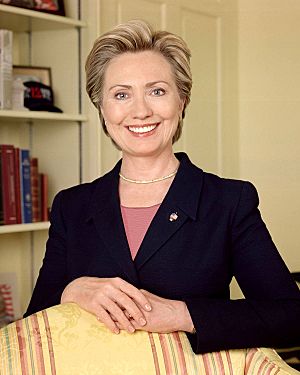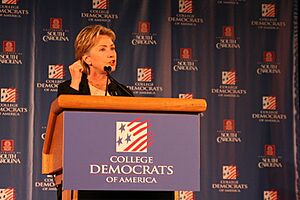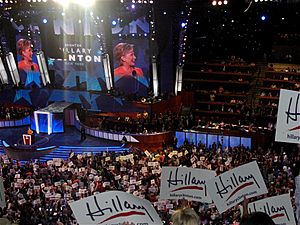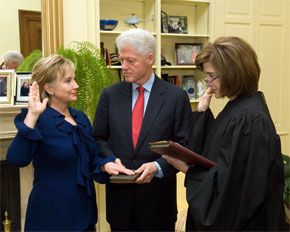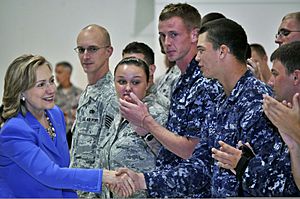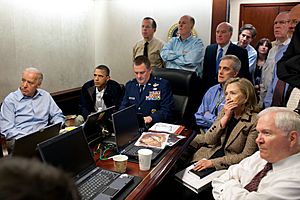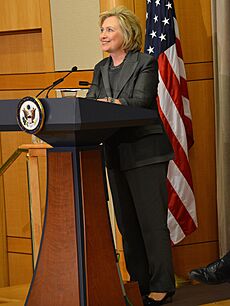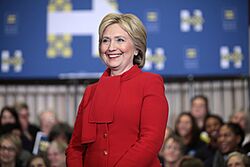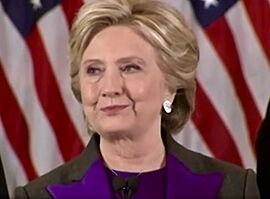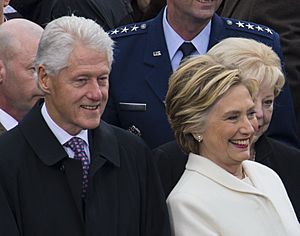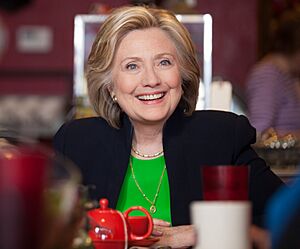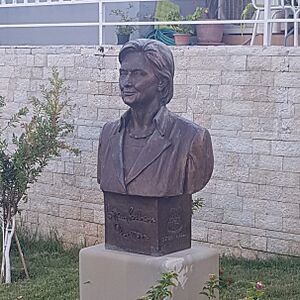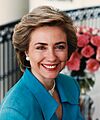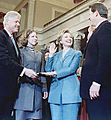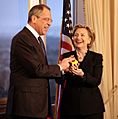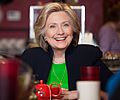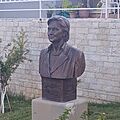Hillary Clinton facts for kids
Quick facts for kids
Hillary Clinton
|
|
|---|---|
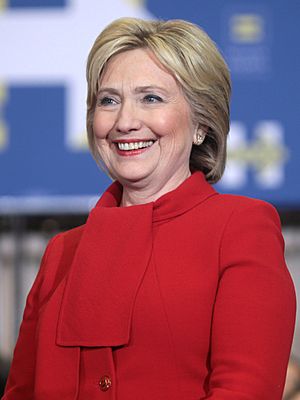
Clinton in 2016
|
|
| 67th United States Secretary of State | |
| In office January 21, 2009 – February 1, 2013 |
|
| President | Barack Obama |
| Deputy |
|
| Preceded by | Condoleezza Rice |
| Succeeded by | John Kerry |
| United States Senator from New York |
|
| In office January 3, 2001 – January 21, 2009 |
|
| Preceded by | Daniel Patrick Moynihan |
| Succeeded by | Kirsten Gillibrand |
| First Lady of the United States | |
| In role January 20, 1993 – January 20, 2001 |
|
| President | Bill Clinton |
| Preceded by | Barbara Bush |
| Succeeded by | Laura Bush |
| First Lady of Arkansas | |
| In role January 11, 1983 – December 12, 1992 |
|
| Governor | Bill Clinton |
| Preceded by | Gay Daniels White |
| Succeeded by | Betty Tucker |
| In role January 9, 1979 – January 19, 1981 |
|
| Governor | Bill Clinton |
| Preceded by | Barbara Pryor |
| Succeeded by | Gay Daniels White |
| 11th Chancellor of Queen's University Belfast | |
| Assumed office January 2, 2020 |
|
| President | Ian Greer |
| Preceded by | Thomas J. Moran |
| Personal details | |
| Born |
Hillary Diane Rodham
October 26, 1947 Chicago, Illinois, U.S. |
| Political party | Democratic (1968–present) |
| Other political affiliations |
Republican (1965–1968) |
| Spouse | |
| Children | Chelsea Clinton |
| Parents |
|
| Relatives | Clinton family (by marriage) |
| Residences |
|
| Education | Wellesley College (BA) Yale University (JD) |
| Awards | Full list |
| Signature | |
Hillary Diane Rodham Clinton (born October 26, 1947) is an American politician, lawyer, and diplomat. She served as the 67th United States Secretary of State under President Barack Obama from 2009 to 2013. Before that, she was a U.S. senator for New York from 2001 to 2009. She also served as the First Lady of the United States from 1993 to 2001, when her husband, Bill Clinton, was president.
A member of the Democratic Party, Hillary Clinton made history in 2016. She became the first woman to win a presidential nomination from a major U.S. political party. She also won the popular vote in the 2016 presidential election, but she did not win the Electoral College. She is the only First Lady of the United States to have run for elected office.
Hillary Rodham graduated from Wellesley College in 1969 and Yale Law School in 1973. After working as a legal advisor for Congress, she moved to Arkansas. In 1975, she married Bill Clinton. She helped start Arkansas Advocates for Children and Families in 1977. In 1979, she became the first woman partner at the Rose Law Firm in Little Rock. She was the First Lady of Arkansas from 1979 to 1981 and again from 1983 to 1992.
As First Lady of the U.S., Clinton worked to improve healthcare. She also played a big part in creating the State Children's Health Insurance Program. This program helps children whose parents cannot afford health insurance. She also supported the Adoption and Safe Families Act and the Foster Care Independence Act.
Clinton was elected to the U.S. Senate in 2000, becoming the first female senator from New York. She ran for president in 2008 but lost to Barack Obama in the Democratic primaries. In 2009, she became Obama's Secretary of State. She worked to improve international relations and helped organize international sanctions against Iran. She also focused on strengthening ties with Asian countries.
After leaving her role as Secretary of State, she wrote several books. She also launched Onward Together, a group that raises money for progressive political causes. Since 2020, she has been the Chancellor of Queen's University Belfast. In 2023, she joined Columbia University as a Professor of Practice.
Contents
- Early Life and Education
- Marriage, Legal Career, and First Lady of Arkansas
- First Lady of the United States (1993–2001)
- U.S. Senate (2001–2009)
- 2008 Presidential Campaign
- Secretary of State (2009–2013)
- Post-Secretary of State Activities
- 2016 Presidential Campaign
- Post–2016 Election Activities
- Political Views
- Religious Views
- Public Image
- Honors and Recognition
- Books by Hillary Clinton
- Interesting Facts About Hillary Clinton
- Hillary Clinton Quotes
- Images for kids
- See also
Early Life and Education
Growing Up in Illinois
Hillary Diane Rodham was born on October 26, 1947, in Chicago, Illinois. She grew up in a Methodist family. When she was three, her family moved to Park Ridge, a Chicago suburb. Her father, Hugh Rodham, owned a successful textile business. Her mother, Dorothy Howell, was a homemaker. Hillary had two younger brothers, Hugh and Tony.
As a child, Hillary was a bright student. She enjoyed swimming and softball. She also earned many badges as a Brownie and a Girl Scout. She was inspired by the Space Race. Around 1961, she wrote to NASA asking how to become an astronaut. She was told that women were not accepted into the program at that time.
She attended Maine South High School. There, she was active in the student council and school newspaper. She was also chosen for the National Honor Society. She was elected class vice president in her junior year. She graduated in 1965, ranking in the top five percent of her class.
Hillary's mother wanted her to have an independent career. Her father, though traditional, believed her abilities should not be limited by gender. She grew up in a politically conservative home. At 13, she helped campaign for a Republican candidate. She later volunteered for Barry Goldwater in the 1964 election.
College Years at Wellesley
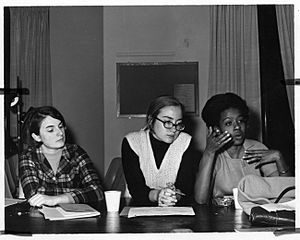
In 1965, Rodham started at Wellesley College. She studied political science. In her first year, she led the Wellesley Young Republicans. She supported moderate Republicans. By her junior year, her views changed. She became a supporter of the anti-war presidential campaign of Democrat Eugene McCarthy.
In early 1968, she was elected president of the Wellesley College Government Association. She held this role until early 1969. After the assassination of Martin Luther King Jr., she organized a student strike. She worked to recruit more black students and teachers. Many students thought she might become the first female president of the United States.
She interned at the Republican Conference of the United States House of Representatives. She also attended a summer program in Washington. She helped Governor Nelson Rockefeller's campaign. However, she was upset by how Richard Nixon's campaign treated Rockefeller. She also disliked what she saw as racist messages. After this, she left the Republican Party for good.
In 1969, she graduated with honors in political science. She became the first student in Wellesley College history to speak at graduation. Her speech followed Senator Edward Brooke's. She received a long standing ovation. She was featured in Life magazine. She also appeared on a national TV talk show.
Law School and Further Studies
Rodham then went to Yale Law School. She worked at the Yale Child Study Center. She learned about early childhood brain development. She also helped children who had been abused. In the summer of 1970, she worked for the Washington Research Project. She researched issues affecting migrant workers. Marian Wright Edelman became an important mentor to her.
In 1971, she started dating fellow law student Bill Clinton. They campaigned together for George McGovern in 1972. She earned her law degree from Yale in 1973. She stayed an extra year to be with Bill. He proposed marriage, but she initially said no.
She continued her studies on children and medicine. In late 1973, her article "Children Under the Law" was published. It discussed the new children's rights movement. The article argued that courts should decide if children are capable on a case-by-case basis. This article was often cited in the field.
Marriage, Legal Career, and First Lady of Arkansas
Moving to Arkansas
After her studies, Rodham worked for the Children's Defense Fund. She also advised the Carnegie Council on Children. In 1974, she worked on the impeachment inquiry staff in Washington, D.C. She advised the United States House Committee on the Judiciary during the Watergate scandal. This work led to President Richard Nixon's resignation.
Rodham was seen as having a bright political future. However, she chose to follow Bill Clinton to Arkansas. He was teaching law and running for Congress. In August 1974, Rodham moved to Fayetteville, Arkansas. She became one of only two female faculty members at the University of Arkansas School of Law.
Early Years in Arkansas

Rodham became the first director of a new legal aid clinic at the University of Arkansas. She and other women also started the city's first center for victims of violence.
In 1975, Rodham and Bill Clinton bought a house. They married on October 11, 1975. She decided to keep her maiden name, Hillary Rodham. This decision was unusual at the time. In 1976, she worked on Jimmy Carter's presidential campaign in Indiana.
In November 1976, Bill Clinton was elected Arkansas attorney general. The couple moved to Little Rock. In 1977, Rodham joined the Rose Law Firm. She specialized in patent infringement and intellectual property law. She also did free legal work for children. She co-founded Arkansas Advocates for Children and Families.
From 1978 to 1981, she served on the board of the Legal Services Corporation. She was the first female chair of that board. When her husband became governor of Arkansas in January 1979, she became the state's First Lady. She held this title for twelve years. She chaired the Rural Health Advisory Committee. She helped get federal money to expand medical facilities in poor areas.
In 1979, Rodham became the first woman to be a full partner at Rose Law Firm. She earned more than her husband from 1978 until they moved to the White House. On February 27, 1980, their daughter, Chelsea Clinton, was born.
Later Years in Arkansas
Bill Clinton was re-elected governor in 1982. During his campaign, Hillary started using the name "Hillary Clinton." She later used "Hillary Rodham Clinton" for her work as First Lady of the state.
Clinton became very involved in state education policy. She chaired the Arkansas Education Standards Committee in 1983. She worked to reform the public education system. She successfully pushed for mandatory teacher testing and state standards. In 1985, she started a program to help parents prepare their children for preschool.
She continued to practice law at the Rose Law Firm. She was known for bringing in new clients. She was also influential in appointing state judges. The National Law Journal named her one of the 100 most influential lawyers in America in 1988 and 1991.
From 1982 to 1988, Clinton was on the board of the New World Foundation. She also chaired the board of the Children's Defense Fund. She served on the corporate boards of TCBY, Wal-Mart Stores, and Lafarge. She was the first woman on Wal-Mart's board. She pushed for Wal-Mart to adopt more environmentally friendly practices.
Bill Clinton's 1992 Presidential Campaign
Hillary Clinton gained national attention when her husband ran for president in 1992. During the campaign, she made some comments that were criticized. She said she could have stayed home and baked cookies, but chose to pursue her career. She later admitted these remarks were not well-thought-out. Bill Clinton famously said that by electing him, the nation would "get two for the price of one," referring to his wife's active role.
First Lady of the United States (1993–2001)
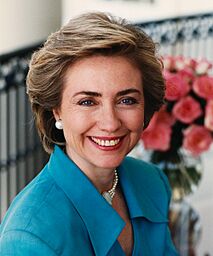
When Bill Clinton became president in January 1993, Hillary Rodham Clinton became the First Lady. She was the first First Lady with a postgraduate degree and her own professional career. She also had an office in the West Wing of the White House. She was a key advisor during the presidential transition. She helped choose many people for the new administration. Many saw her as one of the most influential First Ladies in American history.
Some people thought it was unusual for a First Lady to be so involved in public policy. However, her supporters pointed out that voters knew she would play an active role.
Healthcare and Other Initiatives
In 1993, President Clinton asked Hillary to lead a task force on National Health Care Reform. The plan aimed to require employers to provide health coverage. Opponents called it "Hillarycare." The plan did not get enough support in Congress and was dropped in 1994. Clinton later said her political inexperience contributed to its defeat. Her approval ratings dropped after this.
Despite this, Clinton worked with senators Ted Kennedy and Orrin Hatch to pass the State Children's Health Insurance Program in 1997. She also promoted enrolling children in this program.
She played a role in welfare reform. She helped create the Office on Violence Against Women at the United States Department of Justice. In 1997, she started the Adoption and Safe Families Act. In 1999, she helped pass the Foster Care Independence Act. This act provided more money for teenagers leaving foster care.
International Diplomacy and Women's Rights
Clinton traveled to 79 countries as First Lady. She broke the record for the most-traveled First Lady. She played an important role in U.S. diplomacy.
In September 1995, she gave a powerful speech at the Fourth World Conference on Women in Beijing. She spoke strongly against practices that harmed women worldwide. She declared, "It is no longer acceptable to discuss women's rights as separate from human rights." This speech became a key moment for women's empowerment globally.
In the late 1990s, Clinton spoke out against the treatment of Afghan women by the Taliban. She helped create Vital Voices. This international program encourages women to participate in politics in their countries.
Books and Writings
In 1996, Clinton wrote It Takes a Village: And Other Lessons Children Teach Us. The book shared her ideas for American children. She went on a book tour and appeared on TV to promote it. The book was a New York Times Best Seller. She won a Grammy Award for Best Spoken Word Album in 1997 for the audio version.
Other books she published as First Lady include Dear Socks, Dear Buddy: Kids' Letters to the First Pets (1998) and An Invitation to the White House: At Home with History (2000). She also wrote a weekly newspaper column called "Talking It Over" from 1995 to 2000. It focused on her experiences and the lives of women, children, and families she met.
Save America's Treasures
Clinton was the founding chair of Save America's Treasures. This national effort matched federal funds with private donations. It aimed to preserve and restore historic items and sites. This included the flag that inspired "The Star-Spangled Banner" and the First Ladies National Historic Site.
U.S. Senate (2001–2009)
2000 Senate Election
In November 1998, Senator Daniel Patrick Moynihan announced his retirement. Many Democrats encouraged Clinton to run for his open seat in New York. In September 1999, the Clintons bought a home in Chappaqua, New York. She became the first wife of a U.S. president to run for elected office.
Her main opponent was Rick Lazio, a Republican Congressman. Opponents criticized Clinton for being a "carpetbagger." This meant she had not lived in New York State or been involved in its politics before.
Clinton began her campaign by visiting all 62 counties in New York. She promised to improve the economy in upstate New York. She vowed to create 200,000 jobs. She also proposed tax credits for job creation and business investment.
The election gained national attention. Clinton won the election on November 7, 2000. She received 55 percent of the vote. She was sworn in as U.S. senator on January 3, 2001. For 17 days, she was both First Lady and Senator, a first in U.S. history.
First Term as Senator
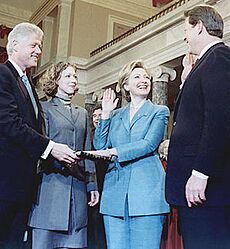
Clinton kept a low public profile when she started her term. She built relationships with senators from both parties. She joined the Senate Prayer Breakfast. She served on five Senate committees. These included the United States Senate Committee on Armed Services and the United States Senate Committee on Health, Education, Labor and Pensions.
After the September 11 attacks, Clinton worked to get funding for New York City's recovery. She helped secure $21 billion for the World Trade Center site's redevelopment. She also investigated the health issues faced by 9/11 first responders. She voted for the USA Patriot Act in October 2001.
Clinton strongly supported the 2001 U.S. military action in Afghanistan. She said it was a chance to fight terrorism and help Afghan women. She voted for the October 2002 Iraq War Resolution. This authorized President George W. Bush to use military force against Iraq. She later said this vote was a "mistake."
She visited American troops in Iraq and Afghanistan. She supported increasing the size of the U.S. Army. She also worked to keep and improve health benefits for reservists. She used her position on the Armed Services Committee to build strong relationships with military officers.
Clinton voted against President Bush's tax cut packages. In 2003, her memoir Living History was released. It sold over one million copies in the first month. The audio recording earned her a Grammy nomination.
She voted against the confirmation of John Roberts as Chief Justice of the United States in 2005. She also voted against Samuel Alito's confirmation to the U.S. Supreme Court in 2006.
In 2005, Clinton called for an investigation into video games. She introduced the Family Entertainment Protection Act. This act aimed to protect children from inappropriate content in video games. She voted against the Federal Marriage Amendment in 2004 and 2006. This amendment sought to ban same-sex marriage.
2006 Reelection Campaign
In November 2004, Clinton announced she would seek a second Senate term. She easily won the Democratic nomination. Her opponent was Republican John Spencer. Clinton won the election on November 7, 2006. She received 67 percent of the vote. Her campaign spent $36 million, more than any other Senate candidate that year.
Second Term as Senator
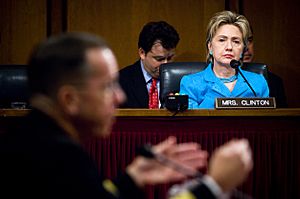
Clinton opposed the Iraq War troop surge of 2007. In March 2007, she voted for a war-spending bill that required troop withdrawal. This bill passed but was vetoed by President Bush. She voted against a compromise bill that removed withdrawal deadlines.
In March 2007, she called for Attorney General Alberto Gonzales to resign. This was in response to the dismissal of U.S. attorneys. She supported the Comprehensive Immigration Reform Act of 2007. This bill aimed to reform immigration laws but did not pass.
As the 2008 financial crisis worsened, Clinton supported the proposed bailout of the U.S. financial system. She voted for the $700 billion law that created the Troubled Asset Relief Program. She said it protected the interests of the American people.
In 2007, Clinton and Senator Jim Webb called for an investigation. They wanted to know if the body armor given to soldiers in Iraq was good enough.
2008 Presidential Campaign
Clinton had been preparing for a presidential run since 2003. On January 20, 2007, she announced her candidacy for the 2008 United States presidential election. No woman had ever been nominated by a major party for president. No First Lady had ever run for president.
Throughout 2007, Clinton led in opinion polls for the Democratic nomination. Senator Barack Obama and former Senator John Edwards were her main rivals. Her past support for the Iraq War was a challenge. Obama had opposed the war from the start.
In the first vote of 2008, she placed third in the Iowa Democratic caucus. Obama and Edwards finished ahead of her. However, Clinton won a surprise victory in the New Hampshire primary on January 8. She narrowly defeated Obama. This was the first time a woman won a major American party's presidential primary.
The contest became very close. Obama won the next eleven contests in February. He gained a significant lead in delegates. On March 4, Clinton won in Ohio. Her criticism of NAFTA helped her in that state. Obama did well in states with many African American or younger voters. Clinton did well with Hispanic or older, working-class white voters.
After the final primaries on June 3, 2008, Obama had enough delegates to become the likely nominee. On June 7, Clinton ended her campaign and supported Obama. Clinton won 1,640 pledged delegates to Obama's 1,763. She also had 286 superdelegates to Obama's 395.
Clinton and Obama each received over 17 million votes during the nomination process. Clinton was the first woman to run in every state's primary or caucus. She greatly surpassed previous records for votes and delegates won by a woman. Clinton gave a strong speech supporting Obama at the 2008 Democratic National Convention. She campaigned for him in fall 2008, and he won the general election.
Secretary of State (2009–2013)
In November 2008, President-elect Obama asked Clinton to be his secretary of state. She was hesitant at first but accepted the position. On December 1, Obama formally announced her nomination. Clinton said it was a "difficult and exciting adventure." To avoid conflicts of interest, Bill Clinton agreed to restrictions on his foundation's activities.
Her appointment required a special law to be passed. Confirmation hearings began on January 13, 2009. On January 21, 2009, Clinton was confirmed by the Senate with a vote of 94–2. She resigned from the Senate that day. She became the first former First Lady to be a member of the U.S. Cabinet.
Time in Office
As Secretary of State, Clinton and President Obama worked well together. Clinton was seen as a team player. She was also a strong defender of the administration to the public. She met with Obama weekly. Obama trusted Clinton's decisions. She also formed an alliance with Secretary of Defense Robert Gates.
Clinton aimed to improve the United States' reputation globally. She called dozens of world leaders. She indicated that U.S. foreign policy would change direction. She said, "We have a lot of damage to repair."
She wanted the State Department to play a bigger role in global economic issues. She called for more U.S. diplomats abroad. Clinton announced the Quadrennial Diplomacy and Development Review. This set goals for the State Department's diplomatic missions. It called for the U.S. to lead through "civilian power." It also prioritized empowering women worldwide. Clinton promoted the use of improved cookstoves in developing countries. This aimed to reduce smoke dangers for women.
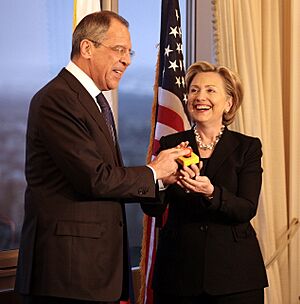
In March 2009, Clinton gave Russian Foreign Minister Sergey Lavrov a "reset button." This symbolized efforts to rebuild ties with Russia. This policy led to better cooperation during Dmitry Medvedev's presidency.
In October 2009, Clinton helped secure a historic agreement. It established diplomatic relations between Turkey and Armenia. Starting in 2010, she helped organize international sanctions against Iran. This aimed to stop Iran's nuclear program. This led to the Joint Comprehensive Plan of Action in 2015.
In January 2010, Clinton spoke about the Internet. She compared the free and unfree Internet to the Iron Curtain. This was the first time a senior U.S. official defined the Internet as a key part of foreign policy.
In July 2010, she visited South Korea. She helped convince a large apparel company to invest in Haiti. This was part of a program to rebuild Haiti after a tropical storm.
The 2011 Egyptian protests were a big challenge for the Obama administration. Clinton's public response changed over time. She first said the government was "stable." Then she called for an "orderly transition to a democratic government." Finally, she condemned violence against protesters.
During the Libyan Civil War, Clinton supported military intervention. This helped gain U.N. approval for the 2011 military intervention in Libya. Clinton used U.S. allies to unite the Libyan rebels. They eventually overthrew the Gaddafi regime.
In April 2011, Clinton supported a raid into Pakistan to find Osama bin Laden. She argued that finding bin Laden was more important than risks to the U.S. relationship with Pakistan. After bin Laden's death, Clinton played a key role in the decision not to release photos of him.
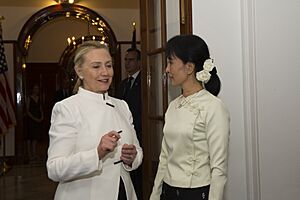
In December 2011, Clinton spoke at the United Nations Human Rights Council. She said, "Gay rights are human rights." She stated that the U.S. would support gay rights abroad. She also visited Burma, the first U.S. Secretary of State to do so since 1955. She met with Burmese leaders and opposition leader Aung San Suu Kyi. She supported the democratic reforms in Burma. She also declared the 21st century would be "America's Pacific century." This was part of the Obama administration's "pivot to Asia."
During the Syrian Civil War, Clinton and the Obama administration first tried to persuade Syrian president Bashar al-Assad to make reforms. As violence increased, they called for him to resign. The administration provided non-lethal aid to Syrian rebels. In mid-2012, Clinton proposed arming and training Syrian rebels. However, White House officials rejected this plan. They feared getting too involved in the conflict.
In December 2012, Clinton was hospitalized for a blood clot. This was discovered after she sustained a concussion from a fall. She had been dehydrated from a viral illness. The clot was treated, and her doctors said she made a full recovery.
Key Themes
Clinton believed in "smart power" as a strategy for U.S. leadership. Smart power combines military strength with diplomacy and U.S. soft power. This includes global economics, aid, technology, and human rights. She was the first Secretary of State to use this approach. She was often one of the more hawkish voices in the administration regarding military force.
Clinton greatly expanded the State Department's use of social media. This helped share its message and empower citizens in other countries. She saw the turmoil in the Middle East as a chance to advance women's rights. She believed women's rights were important for U.S. security. This idea became known as the "Hillary Doctrine."
Clinton visited 112 countries during her time in office. This made her the most widely traveled Secretary of State. She believed in-person visits were more important than ever. In March 2011, she said she would not serve a second term. Obama nominated Senator John Kerry as her successor. Her last day as Secretary of State was February 1, 2013.
Benghazi Attack and Hearings
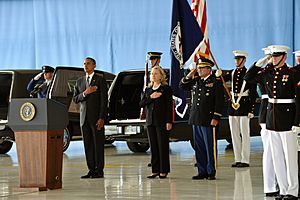
On September 11, 2012, the U.S. diplomatic mission in Benghazi, Libya, was attacked. Four Americans died, including the U.S. Ambassador. The attack and questions about security became politically controversial. On October 15, Clinton took responsibility for security lapses. She said different explanations were due to the confusion of war.
A panel issued a report in December 2012. It criticized State Department officials for ignoring security requests. Clinton accepted the report's conclusions. She said changes were being made.
Clinton testified to Congress on January 23, 2013. She defended her actions. She said she had no direct role in specific security discussions beforehand. When questioned about inaccurate information after the attack, Clinton famously said, "With all due respect, the fact is we had four dead Americans. Was it because of a protest or was it because of guys out for a walk one night who decided that they'd they go kill some Americans? What difference at this point does it make? It is our job to figure out what happened and do everything we can to prevent it from ever happening again, Senator."
A House committee report in November 2014 found no wrongdoing in the administration's response. The United States House Select Committee on Benghazi was created in May 2014. It conducted a two-year investigation. Clinton testified before the committee on October 22, 2015. She was seen as handling the hearing well. The committee's final report in June 2016 found no evidence of fault by Clinton.
Post-Secretary of State Activities
After leaving the State Department, Clinton returned to private life. She joined her husband and daughter as a member of the Bill, Hillary & Chelsea Clinton Foundation in 2013. She focused on early childhood development. She also worked on an initiative to encourage girls' enrollment in secondary schools worldwide.
In 2014, Clinton published her second memoir, Hard Choices. It focused on her time as Secretary of State. She also led the No Ceilings: The Full Participation Project. This project studied the progress of women and girls globally.
She also gave paid speeches, often to Wall Street firms. For the fifteen months ending in March 2015, she earned over $11 million from speeches. By 2015, her net worth was estimated to be over $30 million.
Clinton resigned from the Clinton Foundation board in April 2015. This was when she began her presidential campaign.
2016 Presidential Campaign
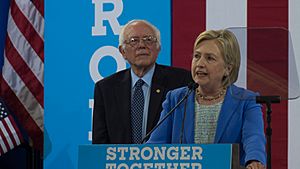
On April 12, 2015, Clinton formally announced her candidacy for president in the 2016 election. Her campaign headquarters were in Brooklyn, New York City. Her campaign focused on raising middle-class incomes and making college more affordable. She also aimed to improve the Affordable Care Act.
Initially, she was expected to easily win the Democratic nomination. However, she faced a strong challenge from Senator Bernie Sanders of Vermont. Sanders' message against corporate influence resonated with voters.
In the first contest, the Iowa Democratic caucuses on February 1, Clinton won very narrowly. She was the first woman to win them. She lost to Sanders in the New Hampshire primary on February 9. However, she won the Nevada caucuses and the South Carolina primary. These victories helped stabilize her campaign.
On March 1, Super Tuesday, Clinton won 7 of 11 contests. She had strong victories across the South, helped by African-American voters. She gained a significant lead in delegates over Sanders. She maintained this lead throughout the primaries. Sanders did better with younger, more liberal voters. Clinton did better with older, black, and Hispanic voters.
By June 5, 2016, she had enough delegates to be considered the likely nominee. On June 7, after winning most states in the final primaries, Clinton held a victory rally. She became the first woman to claim the status of likely nominee for a major American political party. Clinton won 2,219 pledged delegates to Sanders' 1,832. She received almost 17 million votes during the nominating process.
Clinton was formally nominated at the 2016 Democratic National Convention on July 26, 2016. She became the first woman nominated for president by a major U.S. political party. Her running mate was Senator Tim Kaine. Her opponents in the general election included Republican Donald Trump.
Clinton led in national polls over Trump for most of 2016. In early July, polls tied after the FBI concluded its investigation into her emails. FBI Director James Comey said Clinton had been "extremely careless." In late July, Trump gained a lead after the Republican National Convention. Clinton regained a lead after the Democratic National Convention. In fall 2016, Clinton and Tim Kaine published Stronger Together. This book outlined their vision for the United States.
Clinton was defeated by Donald Trump in the November 8, 2016, presidential election. By the early morning of November 9, Trump had enough electoral votes to win. Clinton called Trump to concede and congratulate him. The next morning, Clinton gave a public concession speech. She acknowledged the pain of her loss. She asked her supporters to accept Trump as their next president.
Clinton lost the election with 232 electoral votes to Trump's 306. However, she won the popular vote by more than 2.8 million votes. She is the fifth presidential candidate in U.S. history to win the popular vote but lose the election. She won the most votes of any candidate who did not take office.
Post–2016 Election Activities
Clinton kept a low profile after her 2016 defeat. She often took nature walks in Chappaqua. On January 20, 2017, she attended the inauguration of Donald Trump. She said she was there to honor democracy. Clinton also began writing a book of personal essays. The book, What Happened, was released on September 12, 2017. A children's book version of It Takes a Village was also released.
On March 17, 2017, Clinton gave a speech in Scranton, Pennsylvania. She hinted at being ready to become politically active again. However, the next month, she confirmed she would not seek public office again. She repeated this in March 2019 and said she would not run for president in 2020.
In May 2017, Clinton announced Onward Together. This new political action committee aims to advance the progressive vision. Clinton has also commented on political issues and written several articles.
On April 28, 2020, Clinton endorsed Joe Biden for president in the 2020 United States presidential election. She spoke at the 2020 Democratic National Convention in August. On July 21, 2024, Clinton endorsed Kamala Harris for president in the 2024 United States presidential election. On August 19, 2024, Clinton spoke at the 2024 Democratic National Convention.
Since the election, Clinton has released several books. She and her daughter Chelsea co-authored The Book of Gutsy Women (2019) and Grandma's Gardens (2020). Clinton co-authored the fiction novel State of Terror with Louise Penny in 2021. Clinton's memoir, Something Lost, Something Gained, was released on September 17, 2024.
Clinton has also been involved in media projects. She worked on the documentary film Hillary, released on Hulu in March 2020. On September 29, 2020, she launched an interview podcast called You and Me Both. She has also produced television series.
On January 2, 2020, Clinton became the Chancellor at Queen's University Belfast. She is the 11th and first female chancellor of the university. In January 2023, Columbia University announced that Clinton would join the university as a professor.
Political Views
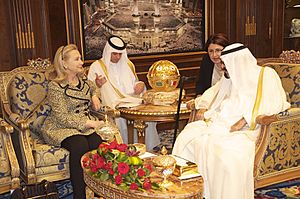
Experts have tried to measure Clinton's political position. National Journal rated her as one of the most liberal senators. The Almanac of American Politics also rated her votes as liberal on economics, social issues, and foreign policy. According to FiveThirtyEight, Clinton was one of the most liberal members during her time in the Senate.
More recent assessments of Clinton's views have also been made. Based on her positions, On the Issues places her in the "Left Liberal" area. Crowdpac gives her a 6.5L rating on a left-right scale.
Economic Ideas
In March 2016, Clinton presented a detailed economic plan. The New York Times called it "optimistic" and "wide-ranging." Her economic ideas are based on inclusive capitalism. She proposed taking back tax benefits from companies that move jobs overseas. She also suggested giving incentives to companies that share profits with employees and communities. She supported increasing collective bargaining rights.
Domestic Policy
Clinton accepts the scientific consensus on climate change. She supports cap-and-trade policies. She opposed the Keystone XL pipeline. She supported "equal pay for equal work" for women. Clinton has focused on family issues and supports universal preschool. She proposed funding these programs by raising taxes on the wealthy. Clinton supported the Affordable Care Act. She would have added a "public option" that competed with private insurers.
LGBT Rights
Clinton supports the right to same-sex marriage. Her position on this has changed over her career. In 2000, she was against such marriages. In 2006, she supported states' decisions to allow them. She opposed a federal amendment to ban same-sex marriage. In 2007, she still opposed same-sex marriage but supported civil unions. In 2013, she first expressed support for a national right to same-sex marriage. In 2016, she wrote an article for an LGBT newspaper.
Immigration Views
Clinton believed that allowing undocumented immigrants a path to citizenship was a "family issue." She supported Obama's program that allowed some undocumented immigrants to avoid deportation. However, in 2014, she said that unaccompanied children crossing the border "should be sent back." She opposed and criticized Trump's call to temporarily ban Muslims from entering the United States.
Foreign Policy Views
On foreign affairs, Clinton voted for the use of military force in Iraq in October 2002. She later said she regretted this vote. She favored arming Syria's rebel fighters in 2012. She also called for the removal of Syrian president Bashar al-Assad. She supported the NATO bombing of Yugoslavia in 1999. She also supported the NATO-led military action in Libya in 2011.
Clinton supports maintaining American influence in the Middle East. She told the American Israel Public Affairs Committee that America cannot be neutral about Israel's security. She supported Israel's right to defend itself during conflicts. In a 2017 interview, after a chemical attack in Syria, Clinton said she favored more aggressive action against Assad. She opposed a ceasefire in the Gaza war, stating that Hamas broke a previous ceasefire.
Religious Views
Clinton has been a lifelong Methodist. She has publicly discussed her Christian faith. Professor Paul Kengor suggests her political positions are rooted in her faith. She often quotes a saying attributed to John Wesley: "Do all the good you can, by all the means you can, in all the ways you can."
Public Image
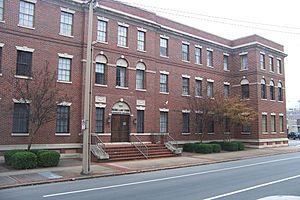
Many books and studies have been written about Clinton. Some conservative publishers have released books criticizing her. Books praising her have not sold as well, except for her memoirs. When she ran for Senate in 2000, groups formed to oppose her.
Clinton has often been featured in media and popular culture. She has been the subject of many satirical impressions on Saturday Night Live. She has also made guest appearances on the show.
She is often described as a polarizing figure. In 2008, a Time magazine cover showed her with "Love Her" and "Hate Her" checkboxes. Newsweek noted that discussions about gender's role in the campaign became part of national politics. Newsweek editor Jon Meacham said that Clinton was "one of the most recognizable but least understood figures in American politics."
When she became Secretary of State, her image improved. She was seen as a respected world figure. However, her favorability ratings dropped after she left office. This happened as she was viewed in the context of partisan politics again. By September 2015, her ratings were low due to reports about her private email use. In March 2016, she admitted, "I'm not a natural politician, in case you haven't noticed."
The TV shows Madam Secretary and The Good Wife were partly inspired by her life. She watched both shows and made a guest appearance on Madam Secretary.
Honors and Recognition
A bust of Clinton was put up in Sarandë, Albania, in 2016. In January 2025, United States President Joe Biden awarded Hillary Clinton the Presidential Medal of Freedom.
Books by Hillary Clinton
- It Takes a Village: And Other Lessons Children Teach Us by Hillary Rodham Clinton (Simon & Schuster, 1996) ISBN: 1-4165-4064-4
- Dear Socks, Dear Buddy: Kids' Letters to the First Pets by Hillary Rodham Clinton (Simon & Schuster, 1998) ISBN: 0-684-85778-2
- An Invitation to the White House: At Home with History by Hillary Rodham Clinton (Simon & Schuster, 2000) ISBN: 0-684-85799-5
- Living History by Hillary Rodham Clinton (Simon & Schuster, 2003) ISBN: 978-0-7432-2224-2
- Hard Choices by Hillary Rodham Clinton (Simon & Schuster, 2014) ISBN: 978-1-4767-5144-3
- Stronger Together: A Blueprint for America's Future by Hillary Rodham Clinton, Tim Kaine (Simon & Schuster, 2016) ISBN: 978-1-5011-6173-5
- What Happened by Hillary Rodham Clinton (Simon & Schuster, 2017) ISBN: 978-1-5011-7556-5
- The Book of Gutsy Women: Favorite Stories of Courage and Resilience by Hillary Rodham Clinton, Chelsea Clinton (Simon & Schuster, 2019) ISBN: 1-5011-7841-5
- Grandma's Gardens by Hillary Rodham Clinton, Chelsea Clinton (Philomel Books, 2020) ISBN: 978-0-5931-1535-0
- Something Lost, Something Gained: Reflections on Life, Love, and Liberty by Hillary Rodham Clinton (Simon & Schuster, 2024) ISBN: 978-1-6680-1723-4
Interesting Facts About Hillary Clinton
- In 1964, at age 17, Hillary helped the Republican presidential candidate Barry Goldwater.
- She earned her Juris Doctor degree from Yale University in 1973.
- She worked on the case to impeach President Richard Nixon after the Watergate scandal.
- She was First Lady during her husband, Bill Clinton's, impeachment process.
- While First Lady, she helped create the 1993 Health Security Act.
- Hillary was the first spouse of an American President to have her own office in the West Wing of the White House.
- Under the Obama administration, she helped increase trade between the U.S. and China.
- As Secretary of State, she traveled to 112 different countries.
- Hillary is a fan of the Chicago Cubs baseball team.
Hillary Clinton Quotes
- "...so much of what happens in life is out of your control, but how you respond to it is in your control."
- "Always aim high, work hard, and care deeply about what you believe in."
- "Every moment wasted looking back, keeps us from moving forward."
- "Fear is always with us, but we just don't have time for it. Not now."
Images for kids
See also
 In Spanish: Hillary Clinton para niños
In Spanish: Hillary Clinton para niños
- 2016 United States presidential election timeline
- Barack Obama Supreme Court candidates
- Electoral history of Hillary Clinton
- List of female United States Cabinet members
- Women in the United States Senate
 | Sharif Bey |
 | Hale Woodruff |
 | Richmond Barthé |
 | Purvis Young |


